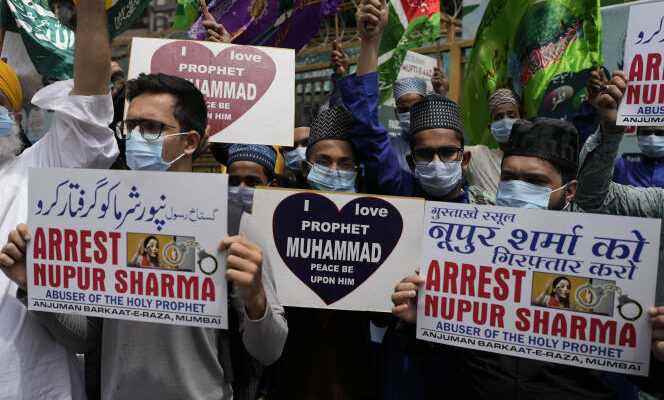New Delhi tries to limit the damage but the diplomatic storm is unleashed. The list of Muslim countries condemning the remarks of a spokeswoman for the ruling party in India against Islam and the Prophet Muhammad continues to grow. The Gulf monarchies, Iran, Iraq, Jordan, Indonesia, Pakistan, Afghanistan, the United Arab Emirates or the Maldives: at least fifteen countries have already reacted to the declarations of Nupur Sharma, suspended on June 5 by the Bharatiya Janata Party – Indian People’s Party (BJP) – of Indian Prime Minister Narendra Modi.
According to intelligence agencies, Al-Qaeda in the Indian subcontinent (AQSI) is threatening, in a letter dated June 6, to carry out suicide attacks in Delhi, Bombay, Uttar Pradesh and Gujarat as part of the “struggle for the honor of the Prophet”.
The Gulf countries were the first to be outraged by these comments, which focused on the relationship between the Prophet and his youngest wife, Aisha. Qatar and Kuwait summoned Indian ambassadors on Sunday. Iran followed suit. Doha even demanded “Indian government a public apology and immediate condemnation of Islamophobic remarks”. This controversy escalated in the Gulf just as Indian Vice President Venkaiah Naidu was visiting Qatar to strengthen ties between the two countries.
Also listen In India, a wave of Islamophobia fueled by power
In India, anger had been rising for several days. The inflammatory remarks, made on the set of the rowdy television channel times now, date back to May 26. The Indian Prime Minister’s party therefore waited more than a week and the first international protests to condemn “firmly insults against any religious personality” and to impose sanctions, welcomed by Qatar and Kuwait. The Hindu nationalist party, along with the suspension of Nupur Sharma, expelled Naveen Kumar Jindal, another Delhi BJP official, who had tweeted similar remarks, before deleting his post.
Resurgence of violence
In an attempt to stem the crisis, the Indian embassies in Qatar and Kuwait claimed that these remarks were those of“marginal elements” and did not reflect the views of the Government of India. Statements immediately derided by Indian commentators, for whom the media Nupur Sharma could not be described as a marginal element.
Despite the measures taken by the BJP and the declarations of Indian diplomacy, international reactions are accumulating. The Organization of Islamic Cooperation (OIC), which has fifty-seven member states, estimated that the controversy took place in a “context of escalating hatred and abuse of Islam in India and systematic actions against Muslims”. Faced with the OIC, the Indian Foreign Ministry did not hesitate to counterattack, calling the organization’s comments “unjustified” and “narrow-minded”.
You have 38.95% of this article left to read. The following is for subscribers only.
